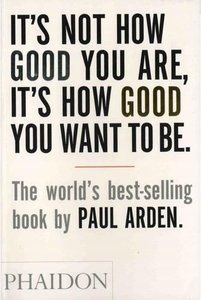Just like the rest of self-help books, I'm holding a reservation for this book's effectivity as soon as I can put them (Paul Arden's set of "good" advice) to test, but judging so far by how they appear, how I understood them, and how I relate my experiences to them, the result is practically a point above skepticism. It's not bad but not so great either.
Design-wise it's good, clearly given from the message inside the cover jacket that states "this book uses the creative processes of good advertising as a metaphor for business practice." Sure. The content on the other hand, shows a lot of amusing stories the ideas were based on, highly on the British author's experiences as an advertising executive. This is also good. But normally, the things we learned from personal experience are limited to how we understood that experience--what the experience meant to us.
Sometimes our understanding is cleverly spot-on, but most of the time it is limited.
Take for example his "Don't take no for an answer" idea. If you do that plainly and literally in any project, you're toast. You might also be percieved as disrespectful. Did the author performed magic to eventually earn the "yes"? Not really. There is a subtle fact that the author was able to reverse his client's decision and it's not about just not taking no for an answer, but it's about practically
KNOWING how to make it a "yes". He made adjustments based on the client's negative feedback. And the next day, after begging for another presentation he earned it. It's no magic as the first time you see that mantra because it's incomplete. It should be rephrased as
"Don't take no for an answer, if you know how to make it a yes." If you do not know how to make it a yes, forget it. It's just employing the value of negative feedback and persuasion.
There are more that I can add to this list of partially conceived ideas but in general and to be fair, the good ones especially the logical ones as clear as a daylight outnumber the weak ones. They are the following (along with my personal thoughts) :
The Good ones:
- It's not what you know, it's who you know. (Painfully true)
- Without having a goal, it's difficult to score.
- Your vision of where or who you want to be is the greatest asset you have.
- When it can't be done, do it. If you don't do it, it doesn't exist.
- The person who doesn't make mistakes is unlikely to make anything.
- Do not seek praise. Seek criticism.
- Do not covet your ideas. (And a lot of us are still selfish!)
- Don't promise what you can't deliver.
- Do not put your cleverness in front of the communication.
- If you get stuck, draw with a different pen.
The Weak ones:
- Don't give a speech. Put on a show. (Putting on a show is still deceptive. Better do it naturally as you are. Live it and don't give a f#ck.)
- It's wrong to be right. (Being right is based on knowledge, experience. The irony here is, the author tells us not to trust what is knowledge in the past, based on his knowledge of the past also. He's practically saying Experience is the opposite of being creative, folks so do not believe in what you learned from experience because I learned it from experience..WTF)
- Have you noticed how the cleverest people at school are not those who make it in life? (Statistically wrong. The number of those who made it in life but did poorly at school is less than those unfortunate ones both in life and in school. In my experience, those who did great at school also did great in life. They are happy where they are now)
- Don't be afraid to work with the best. (Working with the best should be the ideal. It should be "Always want to work with the best." Who doesn't want to work with Hayao Miyazaki or Peter Jackson?)
Looking at the list for now removes my initial feeling that buying this book is probably just a money-grab on behalf of Phaidon. I know that there is something good in this one but also I'm not looking for more unless somebody convinces me otherwise.
Genre: Self-help, Business, Advertising
Rating: 3 ideas based on experience that cannot be trusted


